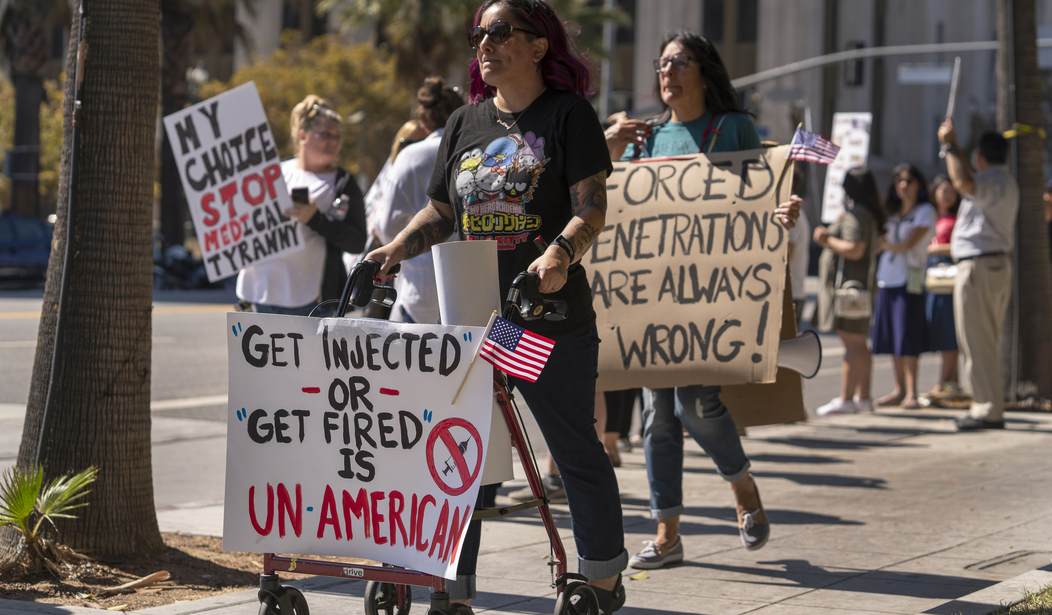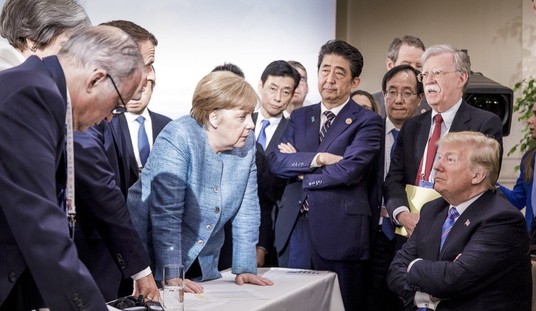An interesting and increasingly uncomfortable political dilemma for the White House.
A month ago, when they first announced the coming OSHA rule requiring workers at companies with 100 or more employees to get vaccinated (or tested weekly), supply-chain problems and the rising prices being driven by them weren’t weighing as heavily on Americans. Now, after another disappointing jobs report and economists beginning to whisper that “transitory” inflation might not be transitory, they’re top-tier political concerns. Especially with Christmas approaching and families wondering if they’ll be able to find the presents they want and the traditional food for holiday dinners.
The harder economic anxiety bites into Biden’s job approval, the more he’s destined to consider delaying his vaccine mandate in order to maximize the number of workers who are on the job during the holidays. The last thing he wants at a moment of high demand when supply chains are already hobbled by missing truckers, longshoremen, and so on is to thin out the labor ranks further by requiring companies to boot employees who refuse to get vaccinated.
But.
As fall turns to winter, the epidemiological case for enforcing the mandate gets stronger. America’s terrible winter wave was already gathering force last year as October turned to November. By Thanksgiving daily deaths were north of 2,000 per day; by early February they were over 4,000. This winter should be better after 12 months of mass vaccination, but one way to hedge against the risk that it won’t be is to force the remaining holdouts in the labor force to get their shots ASAP by enforcing the new mandate immediately, without delay. That would be consistent with Biden’s pro-vax message too. After all, if vaccination is the key to ending the pandemic — so much so that we need a federal mandate to coerce the hesitant — then there’s no sense waiting a day longer than necessary to implement it.
In fact, the holiday season may be an opportune time to squeeze the unvaccinated on getting dosed. The last thing parents want is to get laid off before the holidays, when they’re looking at extra seasonal expenses. They may be more susceptible to having their arms twisted in November and December than in other months.
What’s it going to be, Joe? Delay the mandate until the new year, averting any vaccine-related holiday labor shortages? Or call the bluff of unvaccinated workers, trusting that most of them will cave and get their shots if the mandate is enforced right away? That’s a high-stakes political gamble given how unhappy Americans will be if supply-chain disruptions end up disrupting Christmas too.
Anxious about holes in their work force and the new administrative burden of enforcing the mandate, business lobbyists are urging OSHA and OMB to go slow in rolling out the new rule.
“The overwhelming majority of respondents said to us this is going to negatively impact their businesses and their ability to retain employees,” said Kevin McKenney, director of government affairs at the NLBMDA [National Lumber and Building Material Dealers Association]…
“Many of our members are concerned about the potential loss of employees,” he said. “Many have heard from their employees, who said they’d find employment elsewhere, or said we’re just going to go to another company to look for other work — that they’d rather leave than undergo the requirement.”…
“We asked them [the White House] to provide as long a possible runway regarding the implementation dates and give employers the greatest amount of flexibility as possible,” said Mark Wilson, a vice president at the HR Policy Association, which expressed these concerns in a meeting with officials on Thursday. “There’s a lot of stuff going on right now, and this is going to be a major implementation lift for large companies.”…
[Workplace safety lawyer Eric] Conn was one of a handful of representatives who told The Washington Post that they had asked the Occupational Safety and Health Administration (OSHA) to delay implementing the requirement until after the holiday season.
A related and more bottom-line issue is who’ll have to pay for the weekly test if an unvaccinated employee chooses to get tested in lieu of getting vaccinated? If the company pays, the employee has no great incentive to be immunized instead. The only burden being placed on them is to get swabbed every seven days on someone else’s dime. That’ll be a financial hit to employers and/or insurance companies. If the worker pays, on the other hand, that changes the calculus starkly. It could get expensive for him or her quickly.
I think Biden will probably seize the opportunity to delay that’s presented by the calendar and say that the mandate will take effect sometime early next year. January 1 is an obvious possibility but that might lead the unvaccinated to quit in December, anticipating that they’ll be fired soon anyway. That would cause the holiday disruptions that businesses are worried about. Maybe February 1 instead?
But if Biden delays that long, he’ll have postponed the mandate until the time when last year’s winter wave was reaching its peak. How does he justify any sort of delay with a graph like this floating around?
#COVID19 hospitalizations by vaccination status: There is an 18.5 fold increase in hospitalizations for those unvaccinated compared to those vaccinated (week ending 8/28/21).
Too many eligible Americans are unvaccinated & vulnerable. Please get vaccinated. https://t.co/bfOV5VRcgY https://t.co/F7Nv64LlxS pic.twitter.com/1HIhX67zEF— Rochelle Walensky, MD, MPH (@CDCDirector) October 20, 2021
Or this?

The KFF piece at that last link cites a CDC model indicating that around 50,000 unvaccinated Americans who died in September would have been spared had they gotten their shots. If the CDC comes to Biden and says, based on their best estimates, that rolling out the mandate ASAP will save 50,000 people in November and December, what does he do?
Does it depend on his economists’ model of how many workers would walk off the job over the same period? Or is his priority to maximize lives saved no matter the economic cost? That could be politically pricy for Biden if Christmas season turns into a fiasco.
The irony is that his mandate is likely to be struck down in court in the end. I’ll leave you with Greg Abbott justifying his own anti-mandate mandate in Texas on those grounds. Traditionally it’s the states, not the feds, that set public health policy, he notes. So why shouldn’t Texas’s ban on workplace vaccine mandates trump Biden’s dubious insistence on them via OSHA?
Biden's vaccine mandate is unconstitutional. Period.
Texans shouldn't be forced to choose between their livelihood & a vaccine.
I'm confident the Lone Star State will win any legal showdown my Executive Order may bring. pic.twitter.com/mPcSwVZfxl
— Greg Abbott (@GregAbbott_TX) October 20, 2021








Join the conversation as a VIP Member